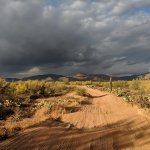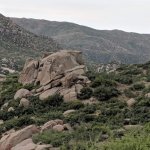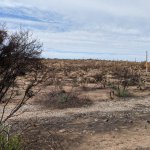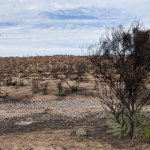The other night, I had a weird dream.
Now, I don’t put a lot of stock in dreams, because in general, I think that’s a bad idea. But I think this one was probably my brain trying to figure out how to process some things.
My wife Jamie and I have hoped, for quite some time, that we will some day be able to retire near the ocean.
We’re a couple of people with big personalities and big anxieties and stresses, and there’s something about just sitting on a beach, feeling small, letting the sound of the surf ebb away at everything inside you, soothing you into a feeling that your problems aren’t really such a big deal in the grand scheme of things. For people like us, it’s incredibly soothing.
It reminds me of an art teacher I had back in high school, who referred to experiences of nature like this as “arbitrary sacred places.” Oceans. Mountains. Certain kinds of forests. Places where you feel your own awareness of self diminish, and instead find yourself more in touch with things that are more ancient, permanent, and deeply rooted than we mere humans can ever be.
In those moments, we often experience a sense of connection with the Author of Creation.
I’ll never forget the sense of closeness to God I had on the snow-crested peak of one of the Seven Devils mountains in Idaho, as the sun was going down, despite the rather unfortunate circumstances that placed me there. It was one of a handful of times I have felt this way, and it’s a heady, unmistakable sensation.
So what of my dream? Well, in it, we had finally gotten a place on the coast. It was a townhome — not my favorite kind of dwelling, but dreams don’t ask you if you care for the décor.
There was a public pool out in the back, with the ocean a little further on, and the kids were swimming in it. Then, very unexpectedly, something happened. The waves from the beach further out got bigger, and started slamming into the glass doors on the back of the house like a tsunami. Everyone in the pool, including my kids, got washed up against the glass.
A very unnerving scene.
Dreams, as anyone who has had them knows, are full of abrupt changes, and so without explanation the image switched suddenly to the exorcist Fr. Chad Ripperger, who, in a video call of some kind, was saying that what was happening with the waves was not just a storm, but was the work of some demon that had some preternatural connection to the sea.
The feeling I was left with when I awoke was not, however, one of foreboding or prophecy. It was clear to me what was going on in my troubled, sleeping mind: everything is overwhelming right now. Even things that should bring peace, like the faith, often fail to do so. The tide of what is wrong in the world is an unstoppable force, it feels very much at times as though it’s driven by a deep and malevolent evil, and it threatens to overtake not just us, but our children and their children.
I’m afraid for them. Afraid for their future. I’m afraid of the dystopian world that my sweet little ones are inheriting. It seems that the powers that are arrayed against us are almost elemental. Like forces of nature, they simply can’t be stopped.
It’s cliché, at this point, to say it, but 2020 has been a runaway train. On fire. With explosions. Radioactive ones.
My family has dealt with more difficult trials this year than ever before, and I know I’ve said that in previous years, too. I have experienced my own brokenness, the weakness of my faith, and the flaws in my character in ways that challenge me profoundly. I have come close, at certain moments, to despair. I have allowed the difficulties outside of me to awaken a deeper darkness within me at times, causing me to lose sight of what matters most and forget who I am and what truly matters.
I look at myself in the wake of these things and I very much do not like what I see.
But as I’ve said repeatedly: the only way out is through. We must endure the suffering, the hardships, the trials – especially, and most agonizingly, the ones that are self-imposed. Growth is a function of destruction and rebirth. The old man has to be torn down to make way for the new.
And we must ask ourselves: will I arise from these ashes, or will this be the monster that defeats me?
The oppressiveness of the pandemic response, the crushing nature of the ever-deepening crisis in the Church, the violent, anti-rational ascendancy of “woke” and “cancel” culture, the tumult of a disputed American presidential election that is being couched in apocalyptic terms, all of it is being stacked hard and heavy on top of the wounds we all already carry, often hidden away from all but our most intimate confidants: damaged familial relationships, broken or struggling marriages, betrayals from loved ones, childhood traumas not yet overcome, crises of faith, personal addictions, neuroses, vices, or sins. All of these things are now working in concert to create an overbearing sense of surreality.
Nothing is as it was before; nothing may ever be the same again. Everything is suspect, including our perception of reality itself. Things we thought were certain have proven not to be. Friends, siblings, children, or parents we thought we knew may have become suddenly adversarial or incomprehensible. Many have lost jobs, businesses, or loved ones. A simple trip to the grocery store or the coffee shop involves a bracing glimpse into a dystopian future we never thought we’d see. Even our usual escapes are tainted: empty sports stadiums, overtly politicized entertainment media, the closure or restriction of venues we might ordinarily make use of to “get away from it all for a while.”
And on top of it all, we may feel guilty for feeling as we do. It’s not, we know, a question of things being “worse” for us than they’ve been for others, historically speaking. There are many who have lost a great deal this year; but most of us still go to bed at night without being hungry, without bombs falling in our city, without fear that our loved ones have been killed by the secret police or an enemy in a far away land. I’ve been to Auschwitz; I’ve done missionary work in deeply impoverished lands; I’ve talked to survivors of war and hard totalitarianism. There is a difference between our situation and theirs.
But sometimes, it’s the sheer proximity to normalcy that makes things all feel that much stranger. It’s almost like the world we knew, except not. It’s the slow, creeping, gradual drift into Orwellianism. Things have become just different enough that even the familiar can feel oddly foreign and somehow wrong, yet just similar enough that we can almost convince ourselves that maybe it’s just us, our perception of things. That maybe we are the real problem.
It’s a lived experience of being gaslit, day in and day out, leaving us to question what is real and what is fake.
This morning, my wife asked me to go to the store for something. I agreed, but as I drove, I decided to leave the nearest supermarket behind and just keep going.
Something I used to do, when the opportunity presented itself, was to go out to the mountain trails here in the Sonoran Desert, and pull my Jeep off-road, taking in the beauty, the rugged terrain, the wildlife, the silence. When you’re powering your way up a steep, rocky hill in low gear, or making your way through a narrow wash, your vehicle perched at an odd angle to the ground as you navigate the sand piles through the curves, you’re very much in the moment. Your focus is — must be — on what’s in front of you, not somewhere else. Your cellphone reception is bad. There’s no mobile data. You have no choice but to be aware of your environment, and it is very much not a virtual construct. Here are some pictures I’ve taken on previous journeys into the desert, just to give you a taste:
But even this is no longer possible.
Today, and for months to come, the trails are all closed, due to extensive wildfires that happened this year. And the high desert, one of the more impressive displays of the resiliency of nature, had been transformed into a blackened, cracked, and blistered mess. Countless saguaros — the iconic, arm-laden upright cacti that grow only in the Sonoran landscape of Arizona and Northern Mexico — had trunks that were soot-black and clearly damaged, many of them likely beyond repair. These are slow growing flora, taking 70 years of maturity before they grow their first arm. Some are centuries old, and will be lost forever.
I grabbed some quick phone photos from the side of the road on my return trip, but they don’t do justice to the extent of what I saw over the wide open landscape, darkened and scarred by the blaze:
What do the wildfires have to do with 2020? I can’t truly say. Perhaps it’s only a coincidence that it has been the hottest year on record for a city already known primarily for its blast-furnace summers. Or that it’s also been one of the driest years on record, with an absolute dud of a monsoon season that provided precious little relief.
The feeling one is left with, though, is distinct: these times are so strangely, relentlessly oppressive, we can’t even escape into nature to forget about the mess mankind is making of things for a while.
That seems to be the underlying theme of this year: no escape. There’s nothing you can do to get away from the politics, the riots, the lockdowns, the division, the sheer madness. There’s nothing you can do to trick yourself, even for a little while, into feeling like things are still normal. Everywhere you look, life is littered with reminders that things are very much not.
And the truth is, it may well get a lot worse before it gets better. This is a reality we will likely have to contend with.
And yet — and yet! — we must not let ourselves be defeated. Now more than ever, we must find a way to break through the malaise our situation elicits. It is imperative that we find gratitude in the midst of trial (and even torment). We need to discover, within ourselves, our families, the beauty of creation, and the things we believe in, that there are still a great many causes for joy.
And so, as Thanksgiving approaches this week here in the United States, I issue a challenge to you: if you’re sitting at home, watching the fiery train wreck of our world through the lens of the news, or social media, and you’ve forgotten to pause for a moment each day and take stock of the blessings in your life, start doing that right now. Be purposefully aware of the good things you still have, and hold them tight – even if you’ve lost more than you think you can bear.
Sometimes, gratitude is the only thing that can save you.
For my part, I am deeply grateful, especially, for the love of my beautiful and longsuffering wife; I have often failed her, hurt her, or taken her for granted, to my deep shame and regret, and I do not deserve her goodness and incredible heart. I am also grateful for my children, who, despite their rambunctiousness and strong wills that often drive me crazy are some of the most amazing people I have had the privilege to know. I’m grateful for good friends, good whiskey and cigars, (and good coffee to help get me up and going again after a night of enjoying them). I’m grateful for the mountains, the stars, and the gentle breeze; for the howling of the coyotes at dusk and the twinkle of the city lights after another impossibly beautiful Arizona sunset. I’m grateful for the fact that God let me open my eyes again today and gave me the ability to go out and wrestle with the big questions; that He will allow me tonight, if I can pull my face away from the many screens that surround me, to step outside and look up at the universe and contemplate the wonders of creation.
I’m grateful, too, for the freedom, at least for now, to keep speaking up for the truth, to keep fighting for what matters, without having to worry about how deeply it will cost me.
What are you grateful for? When you sit down to feast with your family or friends later this week, whether or not it means breaking the ridiculous “rules” to do it, what thanks will you offer to God for the great and gracious gifts He has given?
Take the time to think on these things, and I’m sure you won’t regret it.










